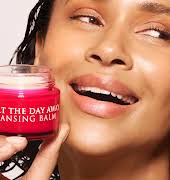Sleep deprivation and menopause go hand in hand: here are tips to help you sleep
By Helen Seymour
09th Apr 2021
09th Apr 2021
Helen Seymour is in peri-menopause, or at least she thinks she is. Follow her on her journey towards the menopause, learning as she does all about the big M.
Exciting news folks — it’s progesterone week. As part of my HRT Programme, I have to take progesterone for the first seven days of every calendar month. For good reason. When you take oestrogen (which I do, daily), a lining builds up in your uterus. Progesterone breaks down that lining and brings about “a scant bleed.”
It’s important to bring about this bleed, in order to break down and shed the lining that the oestrogen builds up. Otherwise, you could be at risk of getting cervical cancer. But that is just the science bit. What I love, and I mean LOVE, about progesterone week, is the deep sleep it brings on.
For the seven days I take progesterone, I get the best sleep ever. I cannot tell you how rested and refreshed I feel. Last weekend, I slept for eleven hours straight. And even when I can only afford six hours of sleep due to an early work call, those six hours are deep and pure sleep, and I wake up feeling completely refreshed. Some women are sensitive to progesterone and can’t take it, and those girls have my deepest sympathies, because progesterone is a Rock Star Hormone, and I am now a devoted groupie.
Sleep deprivation
Sleep deprivation is one of the worst symptoms of the menopause and it affects everything. Your skin, your mood, your energy levels, your weight. If can even worsen some of your other menopause symptoms.
If you are progesterone sensitive, maybe think about your current bedtime routine. That’s if you have one — most of us just crawl into it at the end of the day. That certainly was me for a long time, but I am putting slow changes in place (for the days I’m not taking progesterone), and here are my top ten.
- Switch off all screens, i.e. TV, tablets, mobiles, at least one hour before bedtime. Go on, I dare you. Try it for a week.
- Don’t eat late at night. Try to stop eating after 7 pm. Your body can’t relax into a deep sleep if it’s trying to digest and break down food. It also goes without saying that alcohol disrupts sleep, so ditch this on nights you want a deep and restful sleep.
- Prepare your bedroom for sleep. Turn off all overhead lights, turn on low lamps. Light a natural essential oil candle, with a relaxing fragrance such as lavender. Spray your pillow and bedsheets with a lavender scent. “This Works Deep Sleep Pillow Spray” is amazing.
- Run a relaxing bath with Epsom Salts and lavender essential oils. Soak for at least 30 minutes, preferably in a bathroom lit only by candlelight.
- If you haven’t got time for a bath, or don’t want to have a bath every night, take a Magnesium supplement to relax your muscles and reduce stress before you go to sleep. You can also use Valerian supplements as a natural sleep enhancer
- Get your night time skincare routine down. Cleanse, tone, and put on a nice night cream, ideally something like “Phytomones Sleepless Nights Calming Face Oil”. Designed specifically for hormonal ageing, this gorgeous oil is rich in native plant hormones, which will deeply nourish and replenish your tired skin, while you experience a restful night’s sleep
- While the night cream settles in, indulge in some light reading such as “Self Care For The Real World” by Nadia Narain & Katia Narain Phillips. Any kind of spiritual reading is good at this time. If you like to meditate, then now is a good time to do so. It is also a good time to journal, reflect, and express gratitude.
- Enjoy a small cup of calming tea such as chamomile. WellCo have a lovely calming tea with lemon balm, hops, valerian root, passionflower, skullcap and mango, but there are also many other calming teas widely available
- Stretching helps relax tense muscles. Find some simple yoga stretches, and give your body a gentle stretch as you prepare for sleep
- Use earplugs and eye masks to block any external factors that may disturb you. Banish snoring people to another room
Finally, if you’re not sure if you are progesterone sensitive, or would like to know more about progesterone, make an appointment with Dr. Deirdre Lundy of The Menopause Hub. There are lots of progesterone creams on the market, but some are questionable. Dr Lundy has dedicated her life’s work to this field, so if you are considering progesterone and you’re not sure if it’s for you, go and talk to an expert. Visit www.themenopausehub.ie.
























